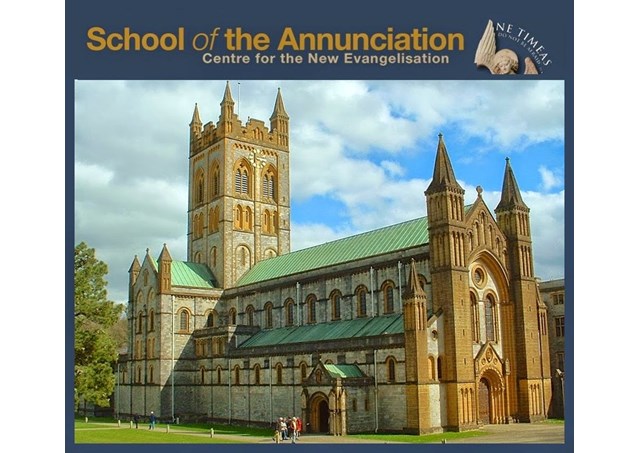
British school of the New Evangelization celebrates England’s Christian past, and looks forward to its future mission

What is the link between today’s feast of St Augustine of Canterbury, yesterday’s feast of St Bede the Venerable – two great saints of the English Church – and the papal coat of arms of Pope Francis?
The answer lies in the Papal crest’s motto, Miserando atque Eligendo, meaning, “lowly, but chosen” (or quite literally, “by having, by choosing him”).
It is taken from a homily on St Matthew’s Gospel by the Venerable Bede and relates to vocation and mission: “Jesus saw a publican, and since he looked at him with feelings of love and chose him, he said to him, ‘Follow me.’”
For Pope Francis, the key to understanding the dynamic in this encounter is mercy. As he explained in an interview to Fr Antonio Spadaro SJ, “I think the Latin gerund miserando is impossible to translate in both Italian and Spanish. I like to translate it with another gerund that does not exist: misericordiando [‘mercy-ing’].”
Thus, in the mind of Pope Francis, Christian mission and evangelization are achieved in practicing mercy. Those who are treated with mercy then discover their own vocation to share the Good News, and to be merciful themselves. This is the example of Christ in the Gospel: “Blessed are the merciful, for they shall obtain mercy” (Matthew. 5:7).
We see this as a feature in the ministry of a predecessor of Pope Francis, St Gregory the Great. Upon seeing English slave children in Rome’s market, he famously stated, Non Angli, sed angeli sunt (“They are not Angles, but angels”). This was the moment he looked upon them with feelings of love and mercy, and desired that they should come to know the truth of the Gospel. Thus, he sent the Prior of St Andrew’s Monastery on the Coelian Hill, St Augustine, to become the "Apostle of the English". How do we know this? St Bede the Venerable records it in his great chronicle: Historia ecclesiastica gentis Anglorum (The Ecclesiastical History of the English People) – a work which earned him the title, "Father of English History".
However, ecclesiastical history is different to other genres of history in that whilst it records that which has passed, it cannot help but look forward. It serves as a clarion for faith, hope, and love - which is the very currency of the Church - as the Gospel is shared with mercy, making new disciples of those who hear the call, “Follow me”.
In England at the present time, this is being realized in the success of its newest – and only – institute of Higher Education dedicated to the New Evangelisation, the School of the Annunciation. Earlier this year, it celebrated its first anniversary, having been founded at Buckfast Abbey by some of the United Kingdom’s leading scholars in theology and evangelization on the feast of the Annunciation, 2014.
From the outset, it was the express intent of those scholars to realize anew the mission - given by Gregory to Augustine - of making new disciples, through programmes of study in theology, evangelization, and catechesis. With students from the United Kingdom, Ireland, the United States, Australia, Gibraltar, Malta, and Dubai, it has already proven faithful in its mission to form new evangelists for a new millennium.
Thus, the recent announcement of a collaborative partnership agreement between the School and the prestigious Franciscan University Steubenville in the United States will enable this new expression of Ss Gregory and Augustine’s mission to yield even further graces both in England, and further afield. As the School of the Annunciation’s rector, Fr Guy de Gaynesford noted, this collaboration has come about from a “joint passion to form disciples of the Lord for the work of the New Evangelisation.”
In the bull of indiction of the Extraordinary Jubilee of Mercy, Misericordiae Vultus, Pope Francis wrote, “Mercy [is] the ultimate and supreme act by which God comes to meet us. ... Mercy: the bridge that connects God and man, opening our hearts to the hope of being loved forever despite our sinfulness. … At times we are called to gaze even more attentively on mercy so that we may become a more effective sign of the Father’s action in our lives. For this reason I have proclaimed an Extraordinary Jubilee of Mercy as a special time for the Church, a time when the witness of believers might grow stronger and more effective.”
As the School of the Annunciation’s mission of mercy commenced on “Lady Day” in 2014, so too, the Jubilee of Mercy will commence on the feast of our Lady’s Immaculate Conception, this coming 8 December, 2015. Mary is the mother of Him who brings grace, mercy, and truth, to a world which desperately needs that misericordiando, that ‘mercy-ing’, which is at the heart of Pope Francis’ own mission as Servant of the Servants of God.
"Mercy and truth have met each other: justice and peace have kissed.” (Psalm 85:10/84:11).
For further information about the Extraordinary Jubilee of Mercy, click here.
For the latest news, and details of courses at the School of the Annunciation, click here.
Phil Andrews
| All the contents on this site are copyrighted ©. |


